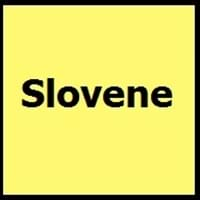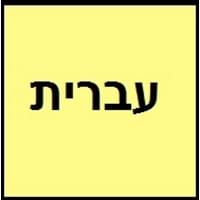Slovene vs Hebrew
Countries
European Union, Slovenia
Israel
National Language
Austria, Croatia, Hungary, Italy, Slovenia
Israel
Second Language
Not spoken in any of the countries
Israel
Speaking Continents
Europe
Africa, Asia, Europe
Minority Language
Austria, Hungary, Italy
Poland
Regulated By
Slovenian Academy of Sciences and Arts
Academy of the Hebrew Language
Interesting Facts
- The Freising Monuments is the oldest preserved records of written Slovene from 10th century.
- The first Slovene book was printed in 1550.
- The original language of Bible is Hebrew.
- The men and women use different verbs in hebrew language.
Similar To
Serbo-Croatian
Arabic and Aramaic languages
Derived From
Not Available
Aramaic Language
Alphabets in
Slovene-Alphabets.jpg#200
Hebrew-Alphabets.jpg#200
Writing Direction
Left-To-Right, Horizontal
Right-To-Left, Horizontal
Thank You
Hvala
תודה (Toda)
How Are You?
Kako se imate?
מה שלומך? (ma shlomxa)
Good Night
Lahko noč
לילה טוב (Laila tov)
Good Evening
Dober večer
ערב טוב (Erev tov)
Good Afternoon
Dober dan
אחר צהריים טובים (Achar tzahara'im tovim)
Good Morning
Dobro jutro
בוקר טוב (Boker tov)
Please
Prosim
בבקשה (bevekshah)
Sorry
Oprostite
סליחה! (Slicha)
Bye
Nasvidenje
להתראות (Lehitraot)
I Love You
Ljubim te
אני אוהבת אותך (Ani ohevet otcha)
Excuse Me
Oprostite
בבקשה!
Dialect 1
Prekmurje Slovene
Ashkenazi Hebrew
Where They Speak
Hungary, Slovenia
Israel
How Many People Speak
Not Available
Dialect 2
Resian
Samaritan Hebrew
Where They Speak
Italy
Israel, Palestine
Dialect 3
Styrian
Yemenite Hebrew
Where They Speak
Slovenia
Israel
Speaking Population
Not Available
Not Available
Second Language Speakers
Not Available
Native Name
Not available
עברית / עִבְרִית (ivrit)
Alternative Names
Slovenian, Slovenscina
Israeli, Ivrit
French Name
slovène
hébreu
German Name
Slowenisch
Hebräisch
Pronunciation
[slɔˈʋèːnski ˈjɛ̀ːzik], [slɔˈʋèːnʃt͡ʃina]
[(ʔ)ivˈʁit] - [(ʔ)ivˈɾit]
Ethnicity
Slovenes
Not Available
Language Family
Indo-European Family
Afro-Asiatic Family
Subgroup
Not Available
Semitic
Branch
Not Available
Canaanitic
Early Forms
No early forms
Biblical Hebrew, Mishnaic Hebrew, Medieval Hebrew, Hebrew
Standard Forms
Slovene
Modern Hebrew
Language Position
Not Available
Signed Forms
Not Available
Signed Hebrew
Scope
Individual
Individual
ISO 639 6
Not Available
Not Available
Glottocode
slov1268
hebr1246
Linguasphere
53-AAA-f
12-AAB-a
Language Type
Living
Living
Language Linguistic Typology
Not Available
Subject-Verb-Object, Verb-Subject-Object
Language Morphological Typology
Fusional
Fusional, Synthetic
Slovene and Hebrew Language History
Comparison of Slovene vs Hebrew language history gives us differences between origin of Slovene and Hebrew language. History of Slovene language states that this language originated in 972-1093 whereas history of Hebrew language states that this language originated in 1000 BC. Family of the language also forms a part of history of that language. More on language families of these languages can be found out on Slovene and Hebrew Language History.
Slovene and Hebrew Greetings
People around the world use different languages to interact with each other. Even if we cannot communicate fluently in any language, it will always be beneficial to know about some of the common greetings or phrases from that language. This is where Slovene and Hebrew greetings helps you to understand basic phrases in Slovene and Hebrew language. Slovene word for "Hello" is Halo or Hebrew word for "Thank You" is תודה (Toda). Find more of such common Slovene Greetings and Hebrew Greetings. These greetings will help you to be more confident when conversing with natives that speak these languages.
Slovene vs Hebrew Difficulty
The Slovene vs Hebrew difficulty level basically depends on the number of Slovene Alphabets and Hebrew Alphabets. Also the number of vowels and consonants in the language plays an important role in deciding the difficulty level of that language. The important points to be considered when we compare Slovene and Hebrew are the origin, speaking countries, language family, different greetings, speaking population of these languages. Want to know in Slovene and Hebrew, which language is harder to learn? Time required to learn Slovene is 44 weeks while to learn Hebrew time required is 44 weeks.





